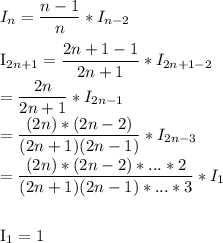
Mathematics, 23.08.2019 11:20 lolgirl9757
(a) use the reduction formula to show that integral from 0 to pi/2 of sin(x)^ndx is (n-1)/n * integral from 0 to pi/2 of sin(x)^(n-2)dx where n> =2 is an integer.
(b)use part (a) to evaluate integral from 0 to pi/2 of sin(x)^3dx and integral from 0 to pi/2 of sin(x)^5dx.
(c) use part (a) to show that, for odd powers of sine, integral from 0 to pi/2 sin(x)^(2n 1)dx is (2*4*6**2n)/[3*5**(2n 1)].

Answers: 1


Another question on Mathematics

Mathematics, 21.06.2019 17:00
Drag the tiles to the correct boxes to complete the pairs. match the cart-coordinates with their corresponding pairs of y-coordinates of the unit circle
Answers: 3

Mathematics, 21.06.2019 22:00
Identify the expression equivalent to 4(x + x + 7) − 2x + 8 − 4 by substituting x = 1 and x = 2.
Answers: 2

Mathematics, 22.06.2019 00:30
Fixed rate mortgage offer: purchase price: $170,000 down payment ($34k): 20% term: 30 years interest rate: 4.25% property tax (yearly): $1,500 homeowner’s insurance (yearly): $1,000 use this example from a fixed-rate mortgage calculator to you answer the questions. keep the page open after you complete this question. according to the calculator, the monthly payment demarco and tanya should anticipate paying for principal and interest is $208. $877. $669. $1,200.
Answers: 1

You know the right answer?
(a) use the reduction formula to show that integral from 0 to pi/2 of sin(x)^ndx is (n-1)/n * integr...
Questions


History, 27.03.2020 01:45


Mathematics, 27.03.2020 01:45


Advanced Placement (AP), 27.03.2020 01:46



Mathematics, 27.03.2020 01:46


Advanced Placement (AP), 27.03.2020 01:46


Mathematics, 27.03.2020 01:46


Mathematics, 27.03.2020 01:46



Computers and Technology, 27.03.2020 01:46


![I= \int\limits^{ \frac{\pi}{2} }_0 {sin^n(x)} \, dx = \int\limits^{ \frac{\pi}{2} }_0 {sin(x)*sin^{n-1}(x)} \, dx \\ = [-cos(x)*sin^{n-1}(x)]_0^ \frac{\pi}{2}+(n-1)*\int\limits^{ \frac{\pi}{2} }_0 {cos(x)*sin^{n-2}(x)*cos(x)} \, dx \\ =0 + (n-1)*\int\limits^{ \frac{\pi}{2} }_0 {cos^2(x)*sin^{n-2}(x)} \, dx \\ = (n-1)*\int\limits^{ \frac{\pi}{2} }_0 {(1-sin^2(x))*sin^{n-2}(x)} \, dx \\ = (n-1)*\int\limits^{ \frac{\pi}{2} }_0 {sin^{n-2}(x)} \, dx - (n-1)*\int\limits^{ \frac{\pi}{2} }_0 {sin^n(x) \, dx\\ ](/tpl/images/0190/7701/29c04.png)

![\int\limits^{ \frac{\pi}{2} }_0 {sin^{3}(x)} \, dx \\ = \frac{2}{3} \int\limits^{ \frac{\pi}{2} }_0 {sin(x)} \, dx \\ = \dfrac{2}{3}\ [-cos(x)]_0^{\frac{\pi}{2}}=\dfrac{2}{3} \\ ](/tpl/images/0190/7701/94d05.png)




